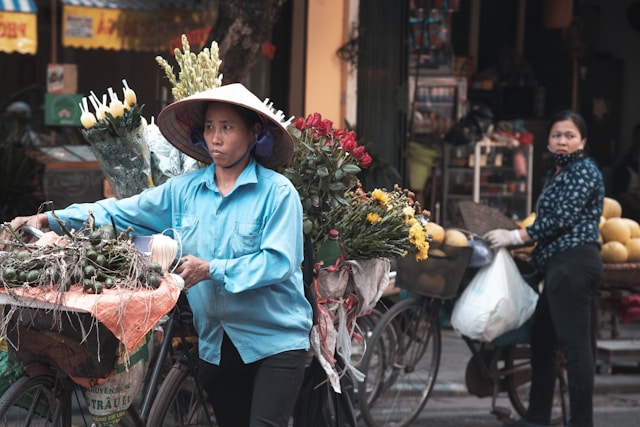Vietnam is a land of rich traditions, warm hospitality, and breathtaking landscapes. As a visitor, it’s easy to be swept away by the natural beauty, vibrant street life, and delicious food. However, to truly appreciate and respect this Southeast Asian gem, it’s essential to be aware of local customs and etiquette. Making unintentional cultural missteps can result in embarrassment, confusion, or even offense. To help you avoid awkward moments, here are 9 etiquette blunders you should never make when in Vietnam — plus a few key tips to make your journey smoother and more respectful.
1. Touching Someone’s Head
In many Western cultures, patting someone on the head can be seen as a kind or affectionate gesture — especially toward children. But in Vietnam, the head is considered the most sacred part of the body, and touching it can be deeply disrespectful. This belief is rooted in Buddhist tradition, where the head is seen as the seat of the soul. Unless you’re extremely close with someone (and even then, it’s best avoided), never touch another person’s head, not even in jest.
2. Pointing with Your Fingers or Feet
Using your index finger or foot to point at someone or something is frowned upon in Vietnamese culture. Pointing is often interpreted as aggressive or accusatory, while feet are considered the lowest and dirtiest part of the body. Pointing your feet at people, religious shrines, or even household objects can be very offensive. Instead, use your whole hand (palm up) to gesture, and always keep your feet flat on the ground when sitting.
3. Showing Too Much Skin in Sacred Spaces
While Vietnam’s beaches may call for swimsuits and tank tops, this attire is not appropriate in temples, pagodas, and other sacred places. Dressing immodestly in religious settings can offend worshippers and may even get you denied entry. When visiting these sites, make sure your shoulders and knees are covered, and avoid tight or flashy outfits. Some locations may offer robes or scarves for visitors who need to cover up — use them!
4. Losing Your Temper in Public
Staying calm and composed is a valued trait in Vietnamese society. Raising your voice, getting visibly angry, or arguing in public is seen as a loss of face, not just for you but for everyone involved. “Saving face” is a cultural cornerstone — preserving dignity and avoiding direct confrontation are crucial. If you find yourself frustrated, whether it’s over a late bus or a miscommunication, take a deep breath and handle it politely and with a smile.
5. Disrespecting Ancestor Altars
Many Vietnamese homes, businesses, and public places have altars honoring ancestors — you’ll spot them with offerings like fruit, incense, and photos. These altars are deeply sacred. Never touch, sit near, or take selfies with an altar, and avoid standing or placing items directly in front of them. If you’re invited into someone’s home, it’s respectful to briefly acknowledge the altar with a small bow or a moment of silence as a gesture of respect.
6. Giving Things with One Hand
When handing over items like money, documents, or gifts, always use both hands. Using one hand, especially your left hand alone, can be seen as lazy or disrespectful. The gesture of offering something with both hands shows humility, respect, and sincerity. Whether you’re paying for street food or handing over your passport at a hotel, this small change in behavior goes a long way in showing cultural awareness.
7. Refusing Food or Drink Too Directly
Hospitality is a huge part of Vietnamese culture, and sharing food or drinks is an expression of connection. If you’re offered something — especially by an elder or host — refusing it too bluntly can come across as rude or ungrateful. Even if you don’t want it, try to decline politely with a smile or by softly saying “dạ không, cảm ơn” (no, thank you). It’s common to initially refuse once or twice before eventually accepting — it’s all part of the social dance!
8. Crossing Your Chopsticks or Sticking Them Upright
Using chopsticks properly is an important part of table etiquette in Vietnam. One major faux pas? Sticking your chopsticks upright into a bowl of rice — this mimics a ritual offering made to the dead and is considered extremely bad luck. Another common mistake is crossing chopsticks on the table, which can be interpreted as disrespectful. Always lay them neatly on the side of your bowl or on a chopstick rest when not in use.
9. Taking Photos Without Asking Permission
Vietnam’s streets, markets, and temples are incredibly photogenic — but that doesn’t mean everything is fair game. Snapping pictures of people without their consent, especially in rural areas or during religious ceremonies, is considered invasive and disrespectful. Before you take a photo of someone (especially elders, monks, or children), always ask politely with a smile or gesture, and accept their answer with grace if they decline.
10. Ignoring Local Customs During Festivals
Vietnamese festivals are colorful, energetic, and rooted in deep tradition. Participating as a guest can be a wonderful cultural experience, but ignoring customs or behaving disrespectfully during a celebration is a major faux pas. During Tết (Lunar New Year), for example, visiting someone’s house uninvited or giving unlucky gifts (like handkerchiefs or anything black) can be seen as inauspicious. If you’re lucky enough to be part of a local festival, do your homework or ask locals about appropriate behavior.
Conclusion
Vietnam is a country that deeply values tradition, respect, and harmony. While locals are often understanding toward visitors, taking the time to learn and follow basic cultural etiquette goes a long way. Avoiding these 9 common blunders will not only help you navigate Vietnamese society more respectfully but also enrich your travel experience. By showing consideration for local customs, you build connections, leave a good impression, and gain a deeper appreciation for the beauty of Vietnamese culture.
FAQs
1. Is it okay to bargain in Vietnam?
Yes, bargaining is expected in many local markets and souvenir shops. However, always do it respectfully and with a smile. Avoid getting too aggressive or haggling over tiny amounts — the goal is fairness, not winning.
2. Can I wear shoes indoors in Vietnam?
In many homes and some temples, you are expected to remove your shoes before entering. Watch what locals do, or look for shoe racks or signs. If in doubt, ask your host.
3. Is tipping customary in Vietnam?
Tipping is not mandatory but increasingly appreciated, especially in tourism-related services like tours, hotel staff, and restaurants. A small tip (5–10%) is a kind gesture for good service.
4. What should I avoid gifting to locals?
Avoid giving clocks, handkerchiefs, knives, or anything black as gifts — these are associated with funerals and bad luck. Instead, opt for thoughtful items like sweets, fruit, or souvenirs from your home country.
5. Is public affection acceptable in Vietnam?
While holding hands is generally okay, kissing or heavy affection in public is frowned upon, especially in rural areas. Show respect by keeping gestures modest.







